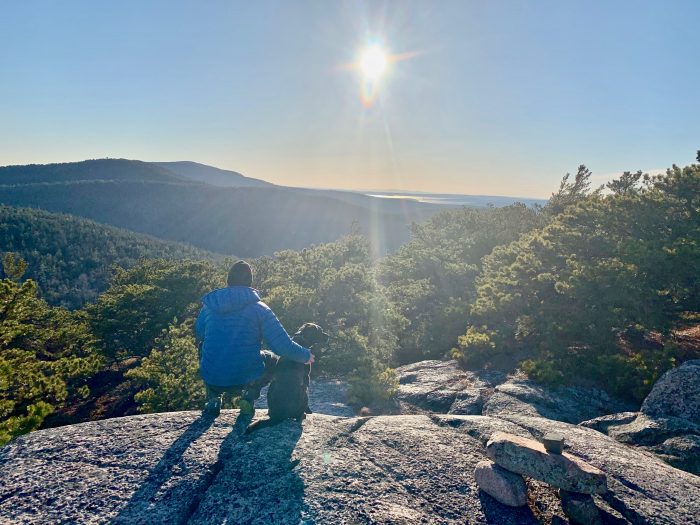Elephant’s Continually-updating Coronavirus Diary. ~ Waylon
~
It was a familiar scene for my little family and I.
Our daughter trotted ahead up the trail, scampering over rocks as we neared her “fort”—a little structure of sticks we’d built (and rebuilt after wind storms) together last year. My husband and I followed, me with our 10-month-old in a carrier on my chest.
When we reached our destination, we all settled into the surroundings and exploration. I set down our son, and his chubby little fingers instantly wove between mosses and grasped for acorns and pine cones, his eyes wide. My husband and daughter began assembling “soup,” collecting pieces of bark, dried leaves, and hemlock cones.
The sun radiated the promise of warmer and longer days. The twitter of newly returned birds filled the treetops with a similar pulse of hope. I watched a crow fly overhead, wings beating. It was possible, for a moment, to forget what is happening in the world of human society.
As the coronavirus pandemic sweeps the world, we have poured outside with our children even more than usual. We reflect often on how fortunate we feel to live next to woods, ponds, and brooks.
I’ve seen many others heeding a similar call to spill out into wide, open spaces as human society shuts down and the headlines coming fast and furious threaten to overwhelm. We’re grasping for perspective, for retreat, for a sense of peace and the reassurance of all that continues.
“Nature is not canceled. The outdoors are not canceled.”
I’ve seen this statement posted on Facebook walls and Instagram, shared in emails and tweets. It’s a potent reminder of all that’s still possible, for sure.
But every time I read that statement, I feel uneasy.
Yes, nature is not canceled. And yes, the natural world provides a welcome retreat at this moment. But the sudden flee to the woods, meadows, beaches, and streams feels a bit like the recognition I’ve seen echoing throughout the climate movement—the one highlighting how much indigenous cultures, practices, and wisdom can teach us as we work to mitigate climate change.
While nature still radiates beauty all around us, our actions as a human society driven by endless economic growth and personal desires for wealth and materialistic comfort have threatened to “cancel nature” for many years. The very activities we suddenly cannot access—shopping (although still continued online), traveling the world by plane or car, fulfilling each desire as quickly as possible—have heaped a mountain of damage upon the natural world. And it’s a damage that is as lethal as any virus.
Many of us have also forgotten that we are a part of the natural world, that our very existence is interwoven with the rest of nature in a powerful web we cannot fully comprehend, but must respect. We exploit, consume, and waste to our heart’s content, deluded by the comforts of modern society into a false sense of control over the world outside our homes and offices.
It’s a complicated moment. Many are suffering and that is going to continue. Alongside the very real economic struggles and tremendous challenge of trying to work from home, make ends meet, and support children suddenly at home, we are also faced with our emotional reactions to the pandemic—our anxiety, our grief.
And in the midst of the very real and harsh challenges and heartache of the crisis, an invitation also exists. It’s not just an invitation to get outside more.
As we are forced to stop our current approach to life, we are invited to consider how we want to reengage, whenever the moment for reengagement comes. The pandemic has highlighted the numerous ways in which our current societies are built not on models of respect and care for others, but on models of exploitation and greed. Is that how we want to continue? Or can we find a new way—one more befitting and honoring of the depth of our interbeing, not only with all other humans, but with all of life on this planet?
By all means, let’s get outside. Let’s feel the sun spread across our faces and listen to the wind whip between branches. Let’s watch spring return and animal and plant life bustle to meet its call.
But let’s consider how we approach this suddenly amplified beckoning of the natural world. Because just as it is absolutely true that we have much to learn from indigenous wisdom, it is also true that we must reconnect with the rest of the natural world.
Colonizing cultures have exploited—and continue to exploit—indigenous ones for many years. Humans have exploited the natural world. A great turning is needed in both regards, one in which we set down those systems of exploitation and disenfranchisement. But the attitude with which we pivot makes all the difference in the world.
If we suddenly pour into nature purely for our own entertainment or sense of peace, we miss the critical opportunity inherent in this moment. We continue to engage with the rest of the natural world on our terms, to meet our desires.
What would it look like, instead, if we walked humbly out of our homes, our places of work, our shopping centers, our entertainment complexes—in short, out of our previous way of life? What if we were propelled by the recognition that we might, in fact, have been mistaken about what is most important in life?
As we turn toward the natural world, let’s turn within ourselves as well. Let’s get outside our homes and our previous way of understanding the world. You know, the one where we humans were supposedly conquerors of the rest of nature.
Let’s make apologies. Let’s learn together. Let’s listen and grieve and really, truly connect. Let’s respect and let’s fall in love.
Nature is open. We have a lot to learn.
~
Relephant:









Read 2 comments and reply